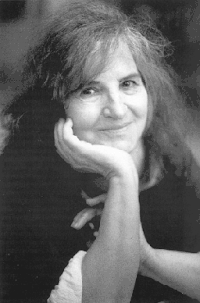Vesna Parun
Vesna Parun (pronounced [v̞ê̞sna pâruːn]; 10 April 1922 – 25 October 2010)[1][2] was a Croatian poet.
Vesna Parun | |
|---|---|
 | |
| Born | 10 April 1922 Zlarin, Kingdom of Serbs, Croats and Slovenes |
| Died | 25 October 2010 (aged 88) Stubičke Toplice, Croatia |
| Resting place | Grohote, Šolta |
| Occupation | Poet |
| Language | Croatian |
| Period | 1947–2001 |
Biography
After schooling in Zlarin, Šibenik and Split, she studied Romance languages and philosophy at the Faculty of Humanities and Social Sciences, University of Zagreb. From 1947 she was a free artist, writing poetry, essays, criticism and children's literature. She translated works from Slovene, German, French and Bulgarian. Her first book of poetry Zore i vihori (1947) received negative reviews from social-realist critics. Zlata Kolarić-Kišur
Starting with the poems collection Crna maslina (1955), love was the primary motif of her written opus. Incessantly working on romantic lyrical poetry, from the 1960s on, she published satiric verses directed at politics and the erotic. She wrote more than 20 works for children alone, the most prominent and widely performed being Mačak Džingiskan i Miki Trasi. She also wrote several drama pieces, the most significant of which is the ballad Marija i mornar. . She is the first woman in Croatia who earned her money solely by being a writer. She published, printed and made illustrations for some of her own books.[3]
Selected works
Parun's other significant works include:
- Vidrama vjerna (1957)
- Patka Zlatka (1957)
- Ti i nikad (1959)
- Konjanik (1961)
- Otvorena vrata (1968)
- Ukleti dažd (1969)
- Stid me je umrijeti (1974)
- Igre pred oluju (1979)
- Šum krila, šum vode (1981)
- Salto mortale (1981)
- Pokraj rijeke Kupe kad se vrapci skupe (1989)
- Nedovršeni mozaik (1990)
- Ptica vremena (1996)
- Smijeh od smrti jači (1997)
- Mozak u torbi (2001)
- More jadransko (2001)
- Noć za pakost: moj život u 40 vreća (2001)
- Da sam brod (2002)
- Suze putuju (2002)
Awards
- 1959 – Award for the poet of the year.
- 1982 – Award for the lifetime achievement.
- 1995 – Poeta Oliveatus at the "Croatia rediviva: Ča, Kaj, Što – baštinski dani" festival.
- 2002 – Visoka žuta žita charter at the Poet Meetings in Drenovci for her overall literary opus and abiding contribution to the Croatian literature,
- 2003 – Tin Ujević Award, for the collection of sonnets Suze putuju
- 2010 – European Award – Knjizevna opstina Vrsac (Literary Municipality of Vrsac)
References
- Antun Vujić, ed. (2009). "Parun, Vesna". Opća i nacionalna enciklopedija (in Croatian).
- Videk, Silva; Derk, Denis (25 October 2010). "Preminula je najveća hrvatska pjesnikinja Vesna Parun". Večernji list (in Croatian). Retrieved 25 October 2010.
- "Biggest Croatian poetess Vesna Parun died in Stubičke Toplice". Archived from the original on 2015-09-24. Retrieved 2015-08-16.
- "Весна Парун: Мајка, жена, љубавница, кухарица и слушкиња". My time. Retrieved 16 February 2017.